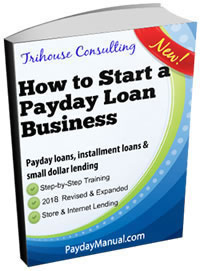CALIFORNIA PAYDAY LOAN LAWS – LEGISLATION FINANCIAL CODE – FIN
DIVISION 10. CALIFORNIA DEFERRED DEPOSIT TRANSACTION LAW [23000 – 23106]
( Division 10 added by Stats. 2002, Ch. 777, Sec. 10. )
CHAPTER 2. Deferred Deposit Transactions [23035 – 23038]
( Chapter 2 added by Stats. 2002, Ch. 777, Sec. 10. )
23035.
California Payday Loans
(a) A California Payday Loans licensee may defer the deposit of a customer’s personal check for up to 31 days, pursuant to the provisions of this section. The face amount of the check shall not exceed three hundred dollars ($300). Each deferred deposit transaction shall be made pursuant to a written agreement as described in subdivision (e) that has been signed by the customer and by the licensee or an authorized representative of the licensee.
(b) A customer who enters into a California Payday Loans deferred deposit transaction and offers a personal check to a licensee pursuant to an agreement shall not be subject to any criminal penalty for the failure to comply with the terms of that agreement.
(c) Before entering into a deferred deposit transaction, licensees shall distribute to customers a notice that shall include, but not be limited to, the following:
(1) Information about charges for California Payday Loans deferred deposit transactions.
[How to Start a Payday Loan Business.”]
(2) That if the customer’s check is returned unpaid, the customer may be charged an additional fee of up to fifteen dollars ($15).
(3) That the customer cannot be prosecuted in a criminal action in conjunction with a deferred deposit transaction for a returned check or be threatened with prosecution.
(4) The department’s toll-free telephone number for receiving calls regarding customer complaints and concerns.
(5) That the California Payday Loans licensee may not accept any collateral in conjunction with a deferred deposit transaction.
(6) That the check is being negotiated as part of a deferred deposit transaction made pursuant to Section 23035 of the Financial Code and is not subject to the provisions of Section 1719 of the Civil Code. No customer may be required to pay treble damages if this check does not clear.
(d) The following notices shall be clearly and conspicuously posted in the unobstructed view of the public by all licensees in each location of a business providing California Payday Loans deferred deposit transactions in letters not less than one-half inch in height:
(1) The California Payday Loans licensee cannot use the criminal process against a consumer to collect any deferred deposit transaction.
(2) The schedule of all charges and fees to be charged on those deferred deposit transactions with an example of all charges and fees that would be charged on at least a one-hundred-dollar ($100) and a two-hundred-dollar ($200) deferred deposit transaction, payable in 14 days and 30 days, respectively, giving the corresponding annual percentage rate. The information may be provided in a chart as follows:
Amount
Provided |
Fee |
Amount of Check |
14-day APR |
30-day APR |
| $100 |
XX |
XXX |
XXX |
XXX |
| $200 |
XX |
XXX |
XXX |
XXX |
(e) An agreement to enter into a deferred deposit transaction shall be in writing and shall be provided by the licensee to the customer. The written agreement shall authorize the licensee to defer deposit of the personal check, shall be signed by the customer, and shall include all of the following:

How to Loan Money to the Masses!
(1) A full disclosure of the total amount of any fees charged for the California Payday Loans deferred deposit transaction, expressed both in United States currency and as an APR as required under the Federal Truth In Lending Act and its regulations.
(2) A clear description of the customer’s payment obligations as required under the Federal Truth In Lending Act and its regulations.
[Want to learn how to start a payday loan company? All the answers, documents, contracts, forms… all the “nuts & bolts” are in our 400+ page manual: “How to Start a Payday Loan or Personal Loan Business.”]
CLICK HERE TO LEARN MORE
(3) The name, address, and telephone number of the California Payday Loans licensee.
(4) The customer’s name and address.
(5) The date to which deposit of check has been deferred (due date).
(6) The payment plan, or extension, if applicable as allowed under subdivision (c) of Section 23036.
(7) An itemization of the amount financed as required under the Federal Truth In Lending Act and its regulations.
(8) Disclosure of any returned check charges.
(9) That the customer cannot be prosecuted or threatened with prosecution to collect.
(10) That the California Payday Loans licensee cannot accept collateral in connection with the transaction.
(11) That the California Payday Loans licensee cannot make a deferred deposit transaction contingent on the purchase of another product or service.
(12) Signature space for the customer and signature of the licensee or authorized representative of the licensee and date of the transaction.
(13) Any other information that the commissioner shall deem necessary by regulation.
(f) The notice required by subdivision (c) shall be written and available in the same language principally used in any oral discussions or negotiations leading to execution of the deferred deposit agreement and shall be in at least 10-point type.
(g) The written agreement required by subdivision (e) shall be written in the same language principally used in any oral discussions or negotiations leading to execution of the deferred deposit agreement; shall not be vague, unclear, or misleading and shall be in at least 10-point type.
(h) Under no circumstances shall a California Payday Loans deferred deposit transaction agreement include any of the following:
(1) A hold harmless clause.
(2) A confession of judgment clause or power of attorney.
(3) Any assignment of or order for payment of wages or other compensation for services.
(4) Any acceleration provision.
(5) Any unconscionable provision.
(i) If the California Payday Loans licensee sells or otherwise transfers the debt at a later date, the licensee shall clearly disclose in a written agreement that any debt or checks held or transferred pursuant to a deferred deposit transaction made pursuant to Section 23035 are not subject to the provisions of Section 1719 of the Civil Code and that no customer may be required to pay treble damages if the check or checks are dishonored.
(Added by Stats. 2002, Ch. 777, Sec. 10. Effective January 1, 2003. Section operative on December 31, 2004, or sooner, pursuant to Section 23104.)
23036.
(a) A fee for a California Payday Loans deferred deposit transaction shall not exceed 15 percent of the face amount of the check.
(b) A California Payday Loans licensee may allow an extension of time, or a payment plan, for repayment of an existing deferred deposit transaction but may not charge any additional fee or charge of any kind in conjunction with the extension or payment plan. A licensee that complies with the provisions of this subdivision shall not be deemed to be in violation of subdivision (g) of Section 23037.
(c) A California Payday Loans licensee shall not enter into an agreement for a deferred deposit transaction with a customer during the period of time that an earlier written agreement for a deferred deposit transaction for the same customer is in effect.
(d) A California Payday Loans licensee who enters into a deferred deposit transaction agreement, or any assignee of that licensee, shall not be entitled to recover damages for that transaction in any action brought pursuant to, or governed by, Section 1719 of the Civil Code.
(e) A fee not to exceed fifteen dollars ($15) may be charged for the return of a dishonored check by a depositary institution in a deferred deposit transaction. A single fee charged pursuant to this subdivision is the exclusive charge for a dishonored check. No fee may be added for late payment.
(f) No amount in excess of the amounts authorized by this section shall be directly or indirectly charged by a licensee pursuant to a deferred deposit transaction.
(g) A licensee shall be subject to the provisions of Title 1.6C (commencing with Section 1788) of Part 4 of Division 3 of the Civil Code.
(Added by Stats. 2002, Ch. 777, Sec. 10. Effective January 1, 2003. Section operative on December 31, 2004, or sooner, pursuant to Section 23104.)
23037.
In no case shall a California Payday Loans licensee do any of the following:
(a) Accept or use the same check for a subsequent transaction, or permit a customer to pay off all or a portion of one deferred deposit transaction with the proceeds of another.
(b) Accept any collateral for a deferred deposit transaction.
(c) Make any deferred deposit transaction contingent on the purchase of insurance or any other goods or services.
(d) Enter into a deferred deposit transaction with a person lacking the capacity to contract.
(e) Alter the date or any other information on a check.
(f) Engage in any unfair, unlawful, or deceptive conduct, or make any statement that is likely to mislead in connection with the business of deferred deposit transactions.
(g) Accept more than one check for a single deferred deposit transaction.
(h) Take any check, instrument, or form in which blanks are left to be filled in after execution.
(i) Offer, arrange, act as an agent for, or assist a deferred deposit originator in any way in the making of a deferred deposit transaction unless the deferred deposit originator complies with all applicable federal and state laws and regulations, including the provisions of this division.
(1) The prohibition specified in this subdivision does not apply to the arranger, agent, or assistant to a state or federally chartered bank, thrift, savings association, or industrial loan company where the state or federally chartered bank, thrift, savings association, or industrial loan company satisfies all of the following:
(A) It initially advances the loan proceeds to the customer.
(B) It does not sell, assign, or transfer a preponderant economic interest in the deferred deposit transaction to the arranger, agent, or assistant, or an affiliate or subsidiary of the state or federally chartered bank, thrift, savings association, or industrial loan company, unless selling, assigning, or transferring a preponderant economic interest is expressly permitted by the primary regulator of the state or federally chartered bank, thrift, savings association, or industrial loan company.
(C) It develops the deferred deposit transaction product or products on its own.
(2) If a licensee offers, arranges, acts as an agent for, or assists a state or federally chartered bank, thrift, savings association, or industrial loan company in any way in the making of a deferred deposit transaction and the state or federally chartered bank, thrift, savings association, or industrial loan company meets the standards set forth in paragraph (1), the licensee shall comply with all other provisions in this division to the extent they are not preempted by other state and federal laws.
(Added by Stats. 2002, Ch. 777, Sec. 10. Effective January 1, 2003. Section operative on December 31, 2004, or sooner, pursuant to Section 23104.)
23038.
(a) Any person who violates any provision of Section 987 of Title 10 of the United States Code, as amended by 126 Stat. 1785 (Public Law 112-239), or any provision of Part 232 (commencing with Section 232.1) of Subchapter M of Chapter I of Subtitle A of Title 32 of the Code of Federal Regulations, as published on July 22, 2015, on page 43560 in Number 140 of Volume 80 of the Federal Register, violates this division.
(b) A person that does not market deferred deposit transactions to, or does not enter into those transactions with, covered borrowers, as that term is defined under Part 232 (commencing with Section 232.1) of Subchapter M of Chapter I of Subtitle A of Title 32 of the Code of Federal Regulations, as amended on the date described in subdivision (a), shall not be in violation of Section 394 of the Military and Veterans Code.
Again, to open your own payday loan business, CLICK HERE to get started.

How to Loan Money to the Masses!
(Amended by Stats. 2017, Ch. 514, Sec. 4. (SB 266) Effective January 1, 2018.)



